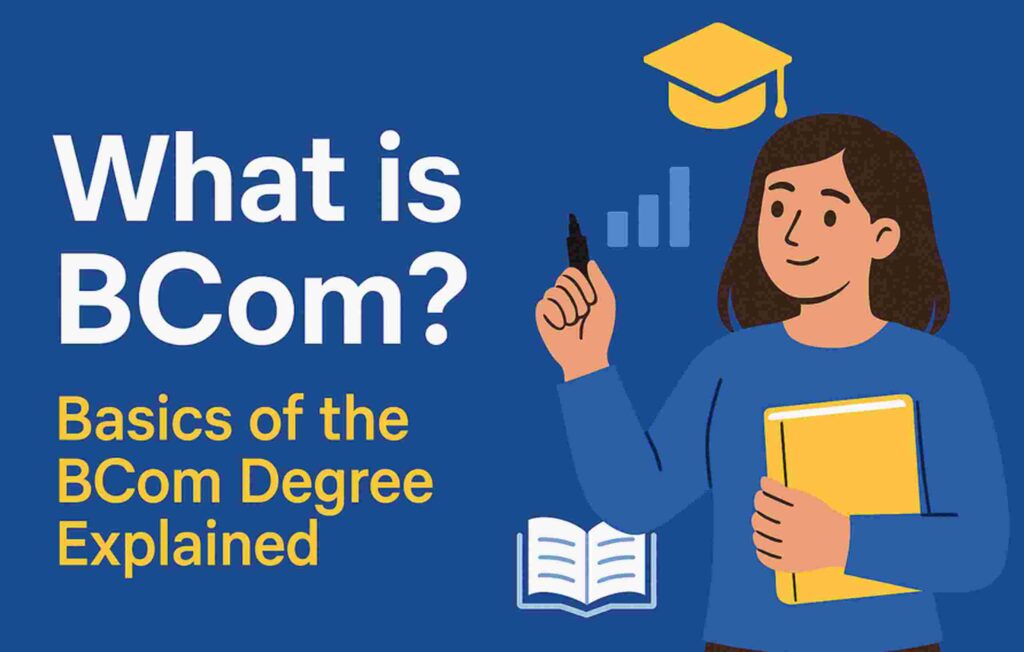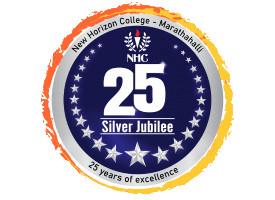BLOGS
What Is BCom? Basics of the BCom Degree Explained

BCom is an undergraduate degree program that deals with the subject of commerce. It is a favorite among students who have completed 12th grade in commerce because they find BCom relatively easy and manageable. This course prepares students to take up good positions in the future by imparting theoretical and practical knowledge. The eligibility criteria, overview of subjects, and career prospects are described in this article.
BCom full form
BCom expands to Bachelor of Commerce. It lays a strong foundation for the various concepts of commerce and business that help students choose a career from multiple opportunities. It is designed to train students with the necessary skills that make them employable.
BCom Course Duration
The Bachelor of Commerce is a three-year undergraduate course. Typically, it is divided into six semesters, with two semesters every year. Some colleges and universities offer internships or specializations that may extend the duration of the course by a year.
BCom Eligibility Criteria
To enroll in a BCom course, students must satisfy specific eligibility criteria:
- Educational Qualification: Students must have completed 12th grade from a recognized board in any stream. Usually, students from the commerce stream have an edge, as they already have basic knowledge about the subject.
- Age criteria: Students who are 16 years of age or older can apply for admission into a BCom course.
- Cut-off marks: Certain colleges and universities prescribe cut-off percentages. Only students who have scored equal to or more than the minimum marks mentioned become eligible to pursue this degree.
BCom subjects and syllabus
The BCom course is curated to cover a wide range of topics in finance, accounting, banking, management, and more. The subjects are generally the same across colleges and universities. Some common subjects include:
- Financial Accounting
- Business Law
- Economics
- Business Management
- Auditing
- Accountancy
- Marketing Management
- Mathematics
- Business Studies
- Financial Accounting
- Taxation
- E-commerce and more.
The subjects and curriculum may differ depending on the institutions. A few of the subjects are core, and others are electives. While the first year is about foundational topics, the second and third years include specializations and practical training. These specializations allow students to explore and decide their future career path. Some specializations are as follows:
- BCom in Law
- BCom in Accounts and Finance
- BCom in Economics
- BCom in Marketing
- BCom Honors
- BCom in Banking and Insurance
- BCom in Financial Management
- BCom in Tourism and Travel Management
- BCom in Human Resource
BCom Course Fees
The fees for a BCom course depend on the type of institution, i.e., private or government-aided, the reputation of the institution, and the place it is located. However, the course is economical and typically ranges from Rs. 10,000 to Rs. 2,00,000 annually. Private institutions charge more because of their advanced infrastructure, well-trained teachers, and excellent placement results. Students can also avail of scholarships provided either by the government or private institutions based on reservation or merit.
BCom General vs. BCom Hons
BCom Hons stands for Bachelor of Commerce with Honors (BCom Hons). The difference is that BCom Hons is a year longer than BCom General. It offers in-depth and advanced knowledge about the subject. The syllabus is comparatively vast and rigorous and emphasizes more research and projects. It demands a high cut-off percentage as it is more specialized and offers more career opportunities.
Scope of BCom Course
- In India, BCom is a well-recognized degree that opens doors to many career opportunities. It prepares students for industry by training them with theoretical and practical knowledge.
- Students who have majored in accounting and have a good grasp of taxation, mathematics, and finance can pursue careers like chartered accountant, company secretary, etc.
- If the specialisation is in e-commerce or marketing, foraying into digital marketing, retail management, or trade can help you get a lucrative job in the expanding e-commerce field.
- Students who want an advanced degree can consider pursuing a postgraduate degree, such as a Master of Commerce (MCom) or a Master of Business Administration (MBA).
- Entering the financial and banking sectors is also quite fruitful. Jobs like investment bankers, financial advisors, etc., are lucrative and highly regarded in society. Students can also prepare for competitive exams to get into government services or bank jobs.
Career Opportunities After BCom
The career paths after graduating in commerce are extensive, but knowing your field of interest is essential before making any decisions.
Jobs in the financial sector:
- Chartered Accountant
- Chief Secretary
- Certified Management Accountant
- Investment Banker
- Accountant
- Financial Consultant
- Insurance Broker
Jobs in the business sector:
- Entrepreneur
- Business Consultant
- Marketing
- Business Analyst
Apart from this, an MBA or MCom degree, government services, and banking jobs are worthy of serious consideration.
Skills for BCom
To do well in this field, some skills are essential, such as:
- Communication: to present ideas and thoughts.
- Mathematics: It will help people understand accounts and finances quickly.
- Accounting: this is important not just for your mark sheet but also for career growth.
- Managerial skills: Most BCom graduates become managers at certain levels. You will work efficiently and develop your career if you possess these skills.
Challenges Faced by BCom Students
Some of the challenges faced by BCom students are:
- Difficulty understanding advanced concepts
- Inadequate basic knowledge
- A very competitive job market
- Poor communication skills
- Insufficient practical experience
- Academic burden
- Stress
- Lack of clarity about career options
These are not severe problems, so students can work on themselves to become productive and hone their skills. Making the foundations strong, setting clear goals, practicing mindfulness, improving communication skills, preparing oneself for the job market, and researching many career opportunities are some tips to stay calm and focused and land a dream job.
Conclusion
If you are into commerce and want to get a BCom degree, the first step is to choose the right college and the specialization that aligns with your interest. Through the course, you will gain theoretical and practical knowledge of the subject. To prepare for the competitive world, refine your skills and start making your resume as early as possible. The scope for BCom is broad in India, and good companies will want to hire you. Therefore, be proactive and ready to join the workforce or build one independently.
Thank you for reading our blog! We hope you found the information helpful and engaging. Don’t forget to explore our latest blog BBA or BCom for more insights. As one of the bca degree colleges in bangalore, we offer a variety of programs designed to enrich your child’s learning experience. You can explore our website to find all the details about our school and the various programs we offer. Happy reading!
If you’re wondering what B.Com is all about, this guide breaks down its core subjects and benefits. It works hand in hand with understanding career opportunities after B.Com and comparing with BBA programs. New Horizon is one of the best colleges for bba in bangalore and a trusted name among bcom colleges in bangalore.
Frequently Asked Questions (FAQs)
1. Which type of B.Com. is best?
Honestly, the best type of BCom depends on an individual’s passion and interest. A BCom Hons degree is the best choice for gaining specialization in any field. It helps in professional courses like CA, CS, etc.
2.Is B.Com easy?
BCom is moderate for students who have studied commerce in 12th grade and understand the topics well. Students from other streams may find it challenging, but it is still manageable if you are open to learning and can adapt quickly.
3.Is BCom a 4-year course now?
Typically, BCom is a three-year undergraduate course. However, in a few colleges and universities, it is a year longer because of some specializations or internships. BCom Hons is a four-year program that imparts in-depth specialization.






